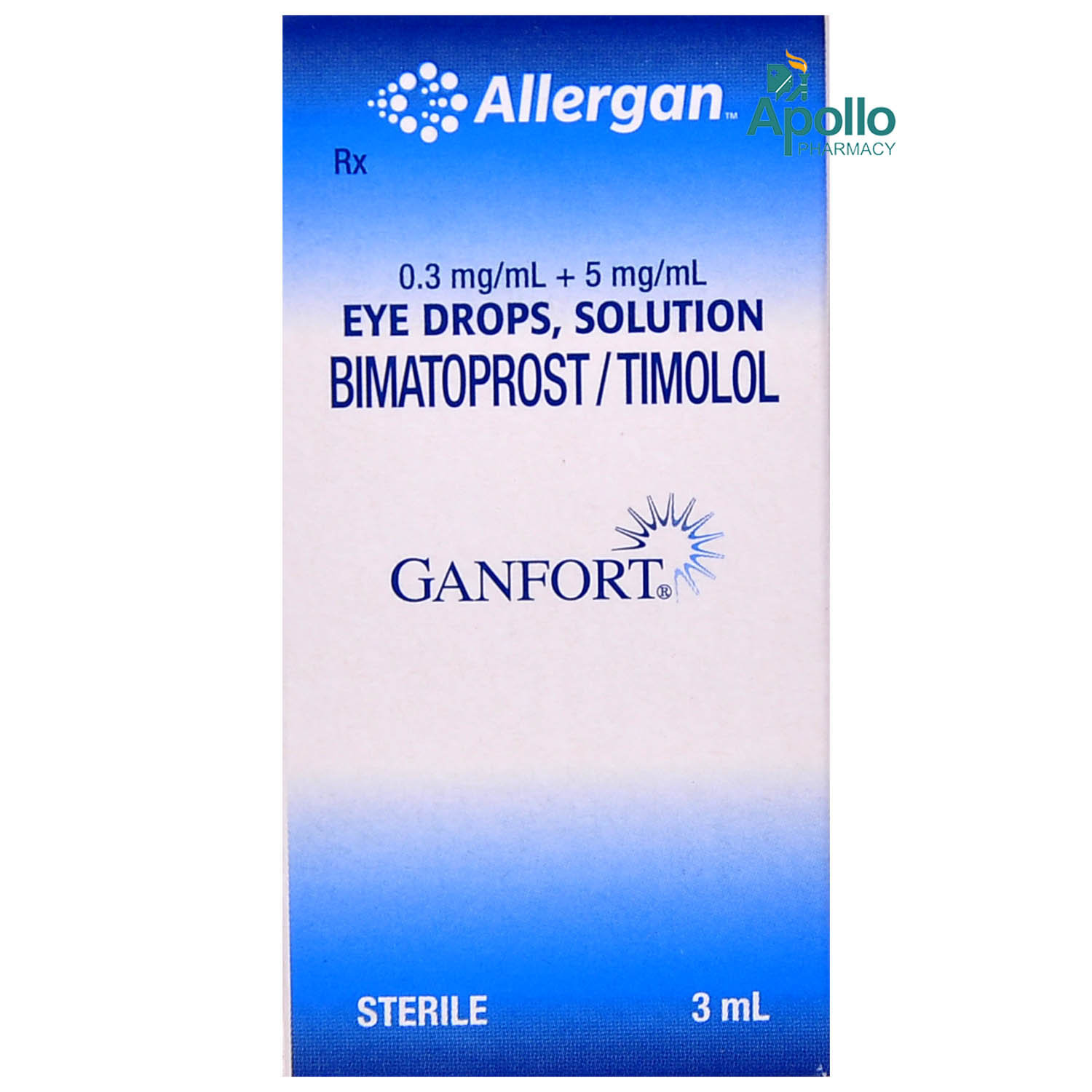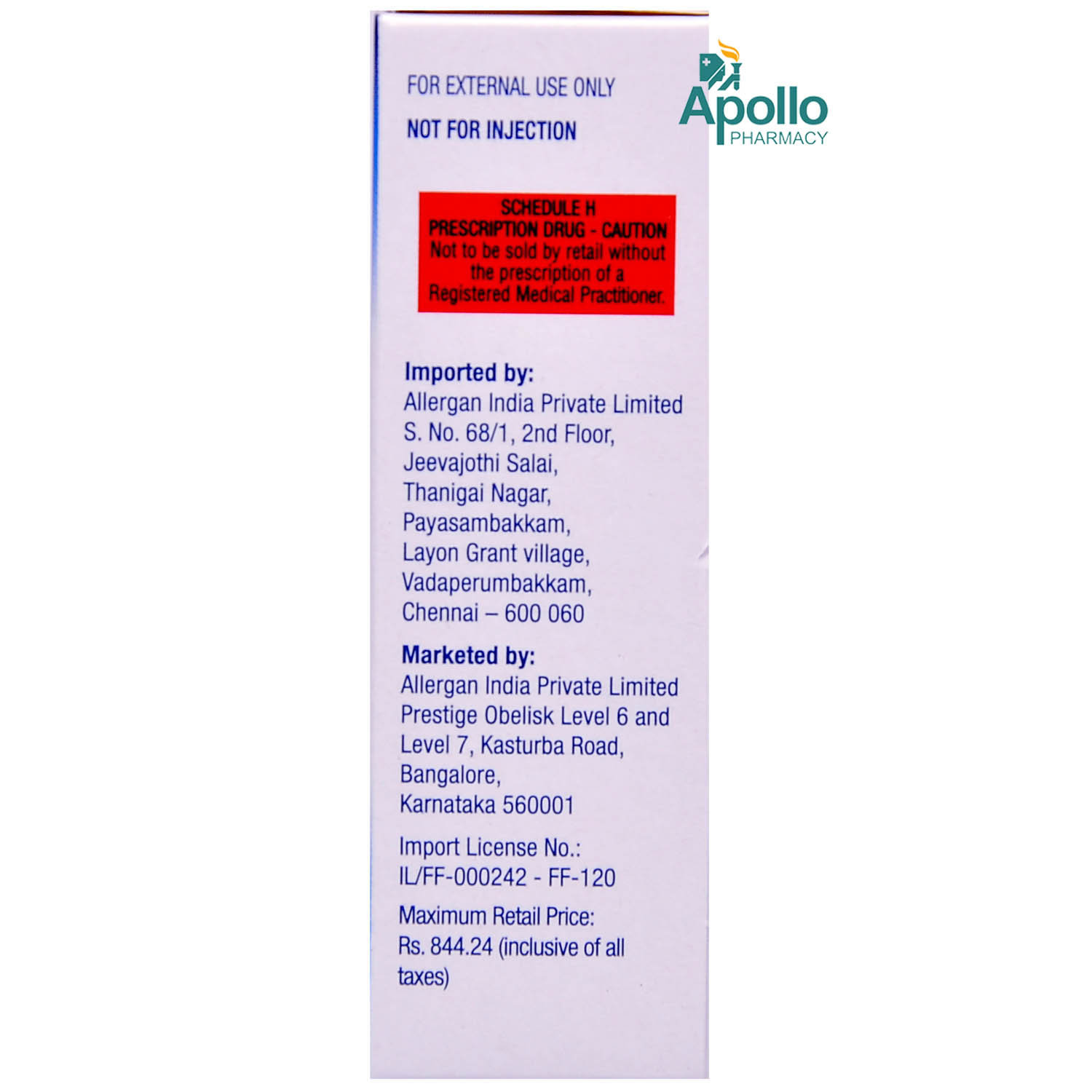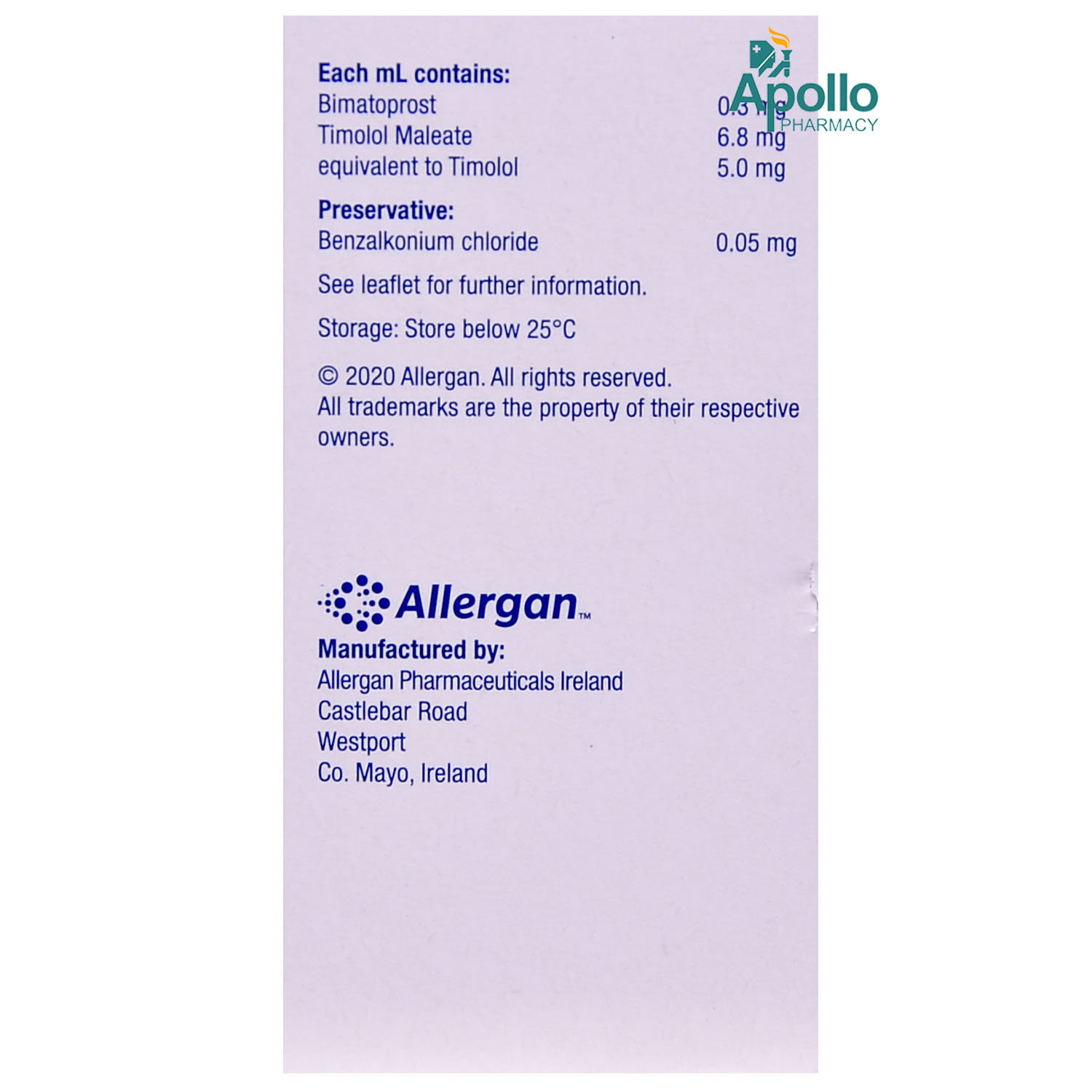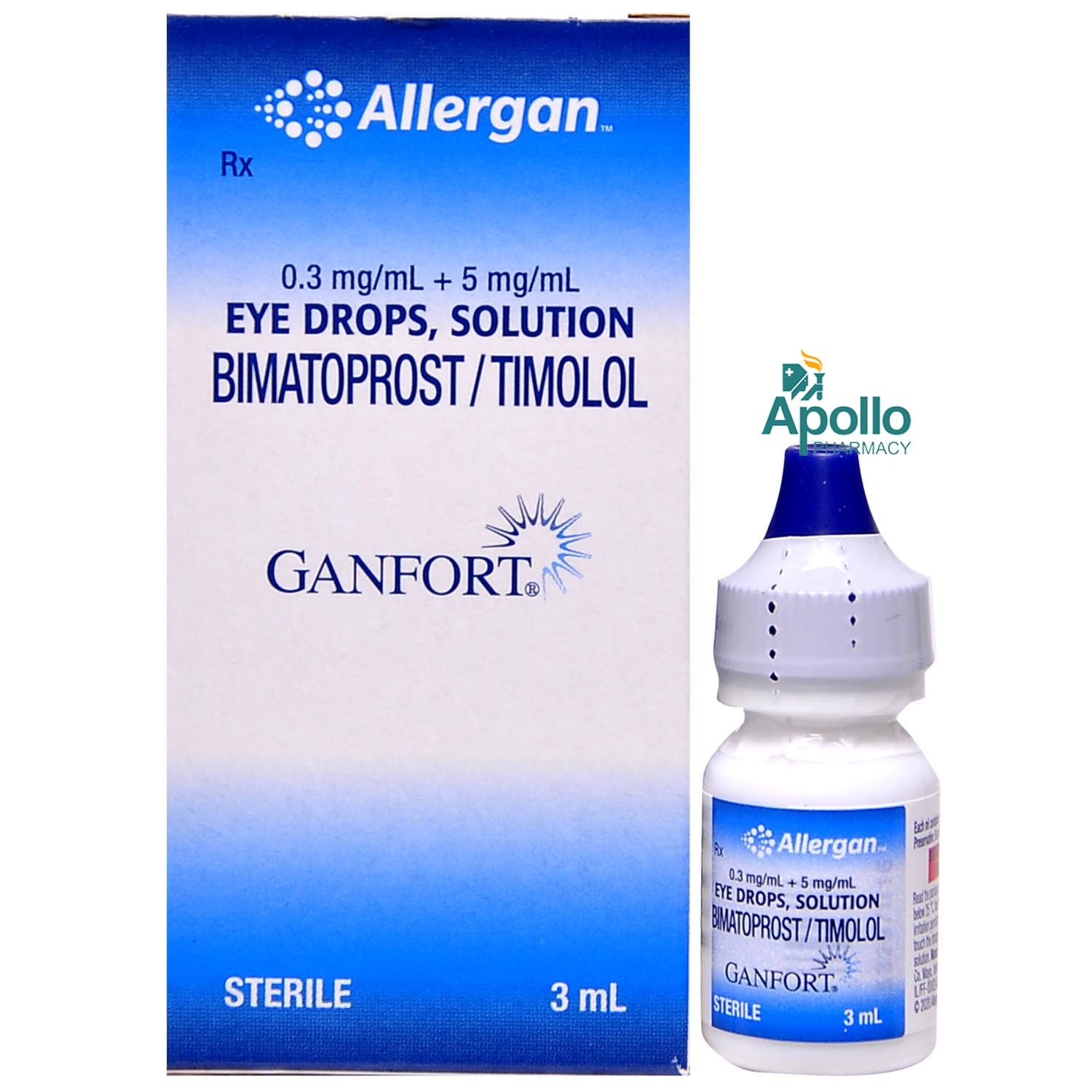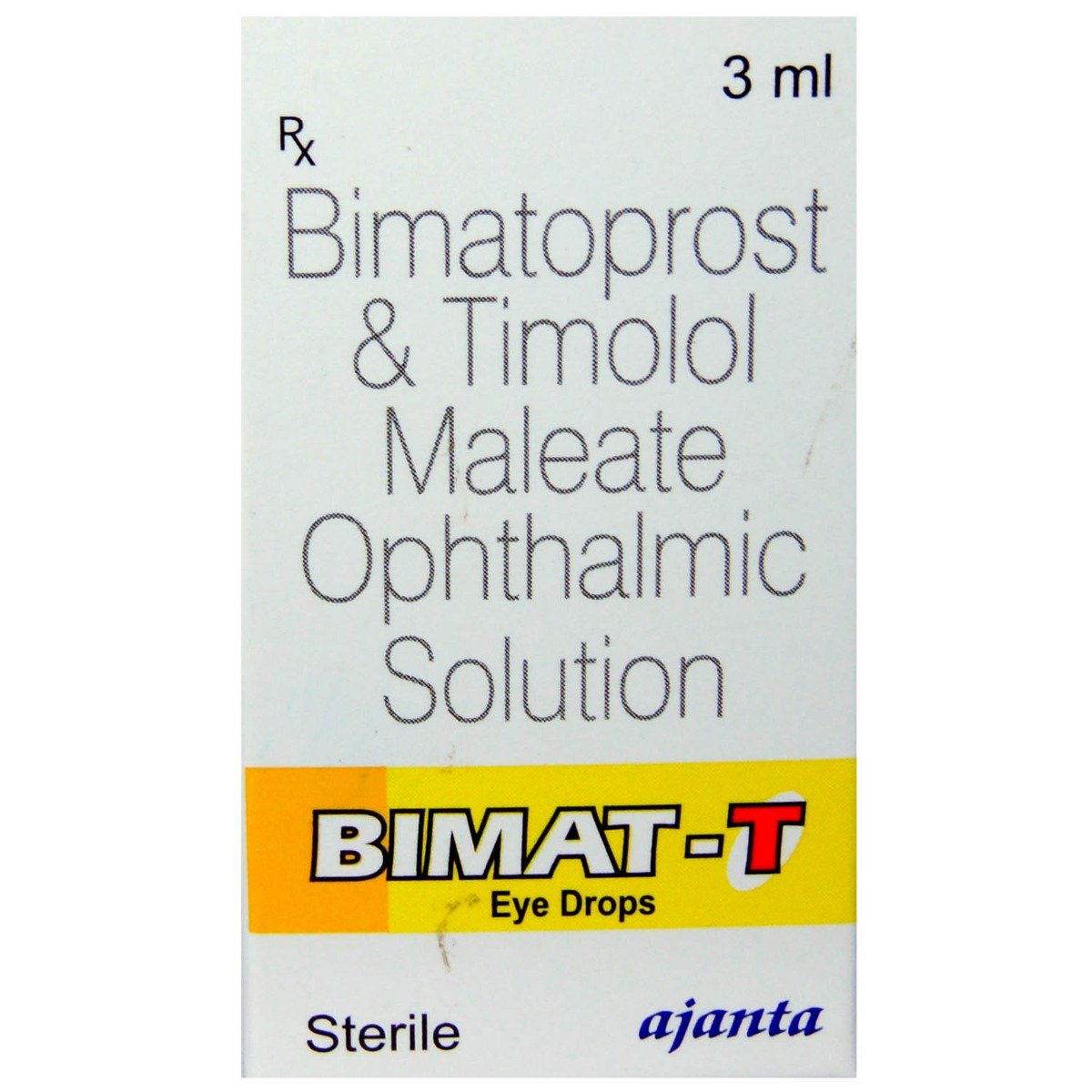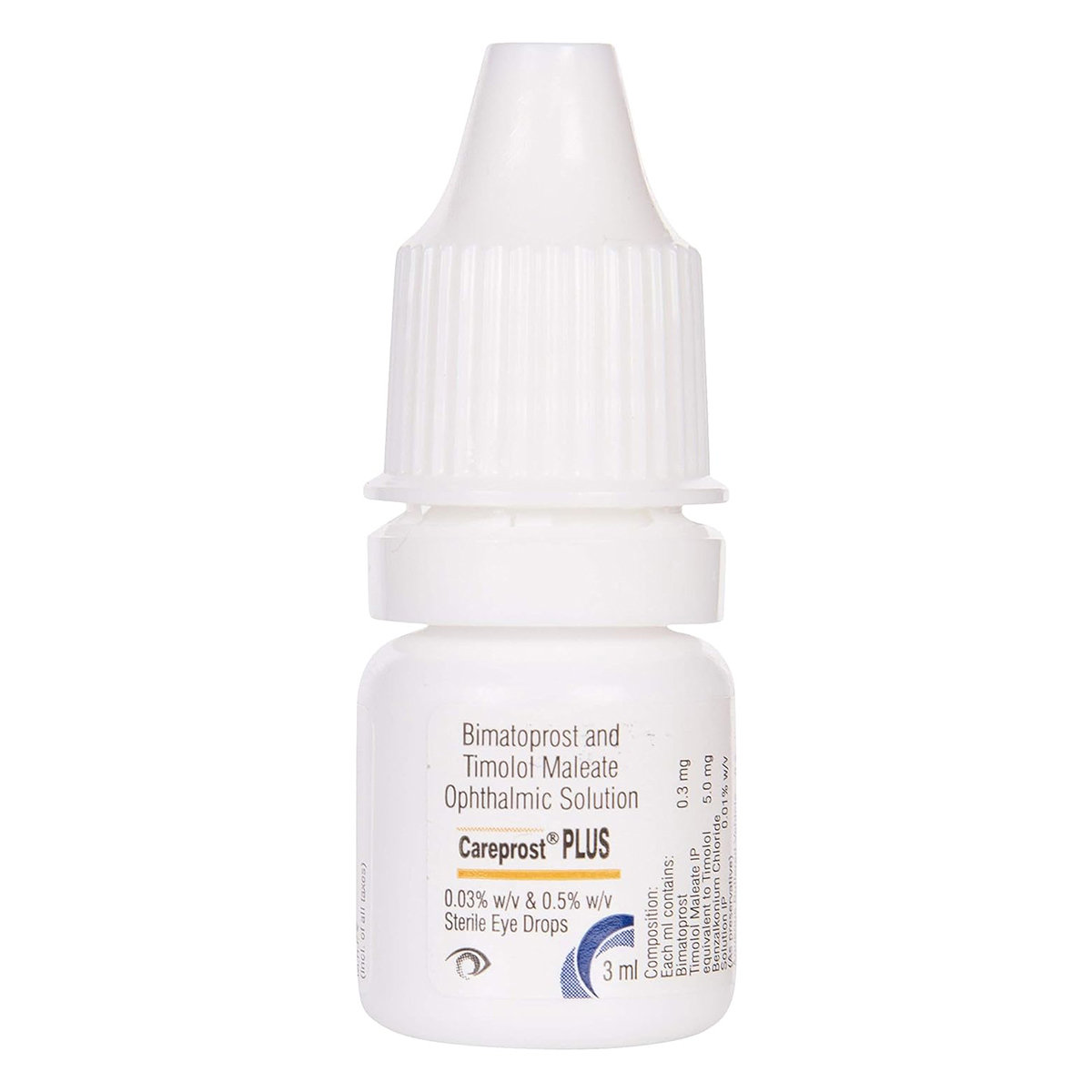Ganfort Eye Drops 3 ml
MRP ₹831
(Inclusive of all Taxes)
₹124.7 Cashback (15%)
Provide Delivery Location
Online payment accepted
 Prescription drug
Prescription drugWhats That
Composition :
Manufacturer/Marketer :
Consume Type :
Expires on or after :
Return Policy :
About Ganfort Eye Drops 3 ml
Ganfort Eye Drops 3 ml belongs to the class of medication called 'ophthalmic preparations' used to treat raised /increased pressure in the eye. It may lead to an illness called glaucoma. Ganfort Eye Drops 3 ml is used alone or in combination with other drugs. Glaucoma is an eye disease in which the optic nerve is damaged. This damaged nerve leads to an increase in eye pressure abnormally.
Ganfort Eye Drops 3 ml contains Bimatoprost (prostaglandin analogue) and Timolol (beta-blocker), primarily used in treating ocular hypertension (high pressure of the eye). Bimatoprost works by increasing the drainage of aqueous humour (fluid in the eye) from the eye and reducing eye pressure. Timolol works by decreasing the fluid production in the eye as the increased pressure can lead to a disease called glaucoma. If the pressure is too high, it can also lead to loss of sight. Ganfort Eye Drops 3 ml should be put only in the infected eye, and contact with the normal eye should be avoided.
Use Ganfort Eye Drops 3 ml as prescribed by your doctor. Ganfort Eye Drops 3 ml is only for use in eyes. You are advised to use Ganfort Eye Drops 3 ml for as long as your doctor has prescribed it for you based on your medical condition. The most common side effects of Ganfort Eye Drops 3 ml are eye pain, darkening of eyelashes, stinging sensation, irritation, foreign body sensation, change in the iris colour, itching, and burning sensation in the eye. Most of these side effects of Ganfort Eye Drops 3 ml are temporary, do not require medical attention, and gradually resolve over time. However, if the side effects are persistent, reach out to your doctor.
Put Ganfort Eye Drops 3 ml only if the doctor prescribes you. Never encourage self-medication or suggest your medicine to someone else. It would help if you did not stop taking Ganfort Eye Drops 3 ml suddenly as it may increase eye pressure. Do not take Ganfort Eye Drops 3 ml if you are allergic to sulphonamides, beta-blockers or have a severe kidney or liver disease. Check with your doctor before starting Ganfort Eye Drops 3 ml if you have dry eyes and cornea problems. If you wear contact lenses or wear them, remove them before using Ganfort Eye Drops 3 ml, and you can put them back 15 minutes after using Ganfort Eye Drops 3 ml. Also, do not stop Ganfort Eye Drops 3 ml abruptly as it may lead to severe side effects. Do not take any other eye medication with Ganfort Eye Drops 3 ml, without consulting your doctor.
Uses of Ganfort Eye Drops 3 ml
Directions for Use
Key Benefits
Ganfort Eye Drops 3 ml is a combination drug containing 'ophthalmic medication,' used to treat raised /increased pressure in the eye. It contains Bimatoprost (prostaglandin analog) and Timolol (beta-blocker), primarily used in treating ocular hypertension (high pressure of the eye). Increased pressure is left untreated; it may lead to an illness called glaucoma. If the pressure is too high, it can also lead to loss of sight. Bimatoprost works by increasing the drainage of aqueous humor (fluid in the eye) from the eye and reducing eye pressure. Timolol works by decreasing the production of fluid in the eye.
Storage
- Wash hands before touching eyes.
- Apply a cold compress for relief.
- Use lubricating eye drops.
- Try over-the-counter decongestant or antihistamine drops.
- Avoid contact lenses during redness.
- Refrain from using mobile phones or laptops at a distance that is too close to your eyes.
- See an ophthalmologist if symptoms worsen, hurt, or affect vision.
- Applying a cold compress can soothe the inflamed portion and reduce itching.
- Wear wraparound sunglasses to protect your eyes from wind, dust, and pollen.
- Gently wash the eyelids using mild soap with lukewarm water to wash away dirt and bacteria.
- Avoid rubbing the eyes or eyelids to prevent the inflammation.
- Keep contact lenses clean and disinfected to avoid infection.
- See a doctor again if changes in your vision or eye symptoms occur.
- Follow a well-rounded diet packed with essential vitamins and proteins.
- Maintain good eye hygiene and gently remove eye makeup.
- Massage your eyelids gently to increase blood flow.
- If you're concerned about unusual or excessive eyelash growth, seek advice from a dermatologist.
- If you notice pigmentation around your eyes, especially after using a new medicine, consult your dermatologist. Your doctor may advise you to discontinue the suspected medicine or recommend alternative medicine.
- Always use a sunscreen with broad-spectrum protection on the face, particularly around the eyes, to prevent further darkening and worsening of pigmentation.
- In some cases, your doctor may recommend topical medications based on your condition.
- A dermatologist may recommend superficial chemical peels to exfoliate the skin and promote new cell growth based on the severity of pigmentation.
- In certain cases, laser treatments may be used to target and break down melanin deposits, however only a qualified dermatologist should perform it.
- Hydrate your body: Drink enough water to prevent dehydration and headaches.
- Calm Your Mind: Deep breathing and meditation can help you relax and relieve stress.
- Rest and Recharge: Sleep for 7-8 hours to reduce headache triggers.
- Take rest: lie down in a quiet, dark environment.
- Cold or warm compresses can help reduce tension.
- Stay Upright: Maintain good posture to keep symptoms from getting worse.
- To treat headaches naturally, try acupuncture or massage therapy.
- Over-the-counter pain relievers include acetaminophen and ibuprofen.
- Prescription Assistance: Speak with your doctor about more substantial drug alternatives.
- Severe Headaches: Seek emergency medical assistance for sudden, severe headaches.
- Frequent Headaches: If you get reoccurring headaches, consult your doctor.
- Headaches with Symptoms: Seek medical attention if your headaches include fever, disorientation, or weakness.
- If you experience symptoms of allergic conjunctivitis like itching, redness, eyelid swelling and watery discharge as side effect of medicine, inform your doctor so that they may change dosage or prescribe alternative medicine.
- Identify and avoid any environmental allergens.
- Use artificial tears to lubricate your eyes and relieve irritation.
- Apply a cool compress to your eyes to reduce itching and inflammation.
- Avoid rubbing your eyes as it can worsen irritation.
- Remove your contact lenses until your symptoms improve.
- Keep your eyes moist and relaxed by blinking frequently.
- Protect your eyes with foods rich in antioxidants, such as leafy greens, berries, etc.
- Avoid glare by using an anti-glare screen.
- Provide relaxation to the muscles of your eyes by gently massaging.
- Sleep for sufficient hours as it will reduce the burden on your eyes and minimize fatigue.
- Protect from UV rays to relax your eyes by wearing UV-protective sunglasses outside.
- Get frequent eye exams and detect problems sooner.
Drug Warnings
Do not take Ganfort Eye Drops 3 ml if you are allergic or hypersensitive to Ganfort Eye Drops 3 ml, other antibiotics, beta-blockers, sulfa drugs. Inform your doctor about all the prescription and non-prescription medications you are taking, especially eye medications, products that contain aspirin, and vitamins. If you have a kidney or liver problem, macular oedema, are pregnant or breastfeeding, inform your doctor before starting Ganfort Eye Drops 3 ml, dose adjustment may be required. If you are taking any other eye medication, please tell your doctor prior. If you wear contact lenses or wearing them, remove them before using Ganfort Eye Drops 3 ml, and you can put them back 15 minutes after using Ganfort Eye Drops 3 ml. Wash your hands properly before using Ganfort Eye Drops 3 ml to avoid any infection.
Drug-Drug Interactions
Drug-Drug Interactions
Login/Sign Up
Co-administration of Clonidine and Ganfort Eye Drops 3 ml together may lower the blood pressure.
How to manage the interaction:
Although there is a possible interaction between Clonidine and Ganfort Eye Drops 3 ml, you can take these medicines together if prescribed by your doctor. However, if you experience headaches, slow heartbeat, dizziness, or feeling like you might pass out, contact a doctor. Do not discontinue any medications without consulting a doctor.
Co-administration of atazanavir with Ganfort Eye Drops 3 ml can increase the risk of irregular heart rhythm.
How to manage the interaction:
Although taking atazanavir and Ganfort Eye Drops 3 ml together can possibly result in an interaction, it can be taken if your doctor has advised it. However, if you experience symptoms such as sudden dizziness, lightheadedness, fainting, or irregular heartbeat consult a doctor immediately. Do not discontinue any medications without consulting a doctor.
Co-administration of Salmeterol with Ganfort Eye Drops 3 ml can decrease the action of both the medications, can increase the risk or severity of side effects including increased risk of asthma, breathing problems.
How to manage the interaction:
Although taking salmeterol and Ganfort Eye Drops 3 ml together can possibly result in an interaction, it can be taken if your doctor has advised it. However, if you experience any unusual symptoms consult a doctor immediately. Do not discontinue any medications without consulting a doctor.
Co-administration of Pirbuterol with Ganfort Eye Drops 3 ml can decrease the action of both the medications, can increase the risk or severity of side effects including increased risk of asthma, breathing problems.
How to manage the interaction:
Although taking pirbuterol and Ganfort Eye Drops 3 ml together can possibly result in an interaction, it can be taken if your doctor has advised it. However, if you experience any unusual symptoms consult a doctor immediately. Do not discontinue any medications without consulting a doctor.
Co-administration of ceritinib with Ganfort Eye Drops 3 ml can increase the risk of irregular heart rhythm.
How to manage the interaction:
Although taking certinib and Ganfort Eye Drops 3 ml together can possibly result in an interaction, it can be taken if your doctor has advised it. However, if you experience symptoms such as dizziness, lightheadedness, fainting, or irregular heartbeat, consult a doctor immediately. Do not discontinue any medications without consulting a doctor.
Co-administration of salbutamol with Ganfort Eye Drops 3 ml can increase the risk of narrowing of the airways.
How to manage the interaction:
Although taking salbutamol and Ganfort Eye Drops 3 ml together can possibly result in an interaction, it can be taken if your doctor has advised it. However, if you experience Coughing, wheezing, shortness of breath, and high-pitched breathing, contact your doctor immediately. Do not discontinue any medications without consulting a doctor.
Taking Ganfort Eye Drops 3 ml with formoterol could reduce the benefits of both medications because they have opposite effects on the body.
How to manage the interaction:
Although taking formoterol and Ganfort Eye Drops 3 ml together can possibly result in an interaction, it can be taken if your doctor has advised it. However, if you experience any unusual symptoms, contact your doctor immediately. Do not stop using any medications without talking to your doctor.
Co-administration of Olodaterol with Ganfort Eye Drops 3 ml can decrease the action of both the medications, can increase the risk or severity of side effects including increased risk of asthma, breathing problems.
How to manage the interaction:
Although taking olodaterol and Ganfort Eye Drops 3 ml together can possibly result in an interaction, it can be taken if your doctor has advised it. Do not discontinue any medications without consulting a doctor.
Co-administration of diltiazem with Ganfort Eye Drops 3 ml can increase the risk or severity of side effects.
How to manage the interaction:
Taking diltiazem with Ganfort Eye Drops 3 ml can lead to an interaction, however, it can be taken only if your doctor has advised it. If you experience symptoms such as fatigue, headache, fainting, swelling of the hands and legs, chest pain, increased or decreased heartbeat, or irregular heartbeats, or difficulty in breathing, contact a doctor immediately. Do not discontinue any medications without consulting a doctor.
Co-administration of verapamil with Ganfort Eye Drops 3 ml can increase the risk or severity of side effects.
How to manage the interaction:
Although taking verapamil and Ganfort Eye Drops 3 ml together can result in an interaction, it can be taken if a doctor has advised it. However, if you experience symptoms such as fatigue, headache, fainting, swelling of the extremities, weight gain, shortness of breath, chest pain, increased or decreased heartbeat, or irregular heartbeat consult a doctor immediately. Do not discontinue any medications without consulting a doctor.
Drug-Food Interactions
Drug-Food Interactions
Login/Sign Up
Diet & Lifestyle Advise
- Avoid alcoholic beverages with Ganfort Eye Drops 3 ml as it can make you dehydrated and affect the eye pressure.
- Visit an optician regularly to monitor your eye pressure.
- Try to include heart-healthy omega 3 fatty acid-containing food drinks in your daily diet. You can also use low-fat cooking oil like olive oil, soybean oil, canola oil, and coconut oil.
- A diet including green and leafy vegetables, and fruits helps to lower eye pressure.
- Do regular moderate exercise and appropriate rest is important for illness.
- Fruits and vegetables which contain Vitamin A and C help to improve vision and recover from the disease.
Side Effects of Ganfort Eye Drops 3 ml
- Eye pain
- Darkening of eyelashes
- Stinging sensation
- Irritation
- Foreign body sensation
- Change in colour of the iris
- Itching
- Burning sensation in the eye
Habit Forming
Therapeutic Class
All Substitutes & Brand Comparisons
RX
Bimat T Eye Drops 3 ml
Ajanta Pharma Ltd
₹465.5
(₹139.67/ 1ml)
43% CHEAPERRX
Out of StockBimato MST Eye Drops 3 ml
Guerison MS Inc
₹495
(₹148.5/ 1ml)
40% CHEAPERRX
Careprost Plus Eye Drops 3 ml
Sun Pharmaceutical Industries Ltd
₹667.5
(₹200.27/ 1ml)
19% CHEAPER
Drug-Diseases Interactions
Drug-Diseases Interactions
Login/Sign Up
FAQs
Drug-Drug Interactions Checker List
- ATENOLOL
- NIFEDIPINE
- VERAPAMIL
- QUINIDINE
- METFORMIN
- GLIBENCLAMIDE
- FLUOXETINE
- PAROXETINE
- LATANOPROST
- TAFLUPROST
- TRAVOPROST
- UNOPROSTONE
Special Advise
- Remove your contact lenses before using Ganfort Eye Drops 3 ml to avoid any unpleasant side effect
- Do not use two eye medications together, maintain a gap of 10-15 minutes between the two.
Disease/Condition Glossary
Glaucoma: It is an eye disease in which the optic nerve is damaged. This damaged nerve leads to an increase in eye pressure abnormally. If not treated, it can lead to loss of vision. It is a major cause of blindness in people who are above the age of 60 years.
Ocular hypertension: It is a condition in which the pressure of the eye is higher than normal. The increased pressure can be due to certain other diseases, an injury, or an adverse effect of certain medications. If left untreated, it can lead to optic nerve damage and permanent vision loss.

Have a query?
Alcohol
Safe if prescribed
Alcohol is not known to cause any unpleasant side effects if taken along with Ganfort Eye Drops 3 ml. But intake of alcohol with Ganfort Eye Drops 3 ml may damage your liver. So intake of Ganfort Eye Drops 3 ml should be avoided with Ganfort Eye Drops 3 ml.
Pregnancy
Consult your doctor
Ganfort Eye Drops 3 ml is a pregnancy Category C medicine. It may affect pregnant women or the fetus. Hence, the intake of Ganfort Eye Drops 3 ml should be avoided if you are pregnant or planning to become pregnant as it may harm the baby.
Breast Feeding
Consult your doctor
Ganfort Eye Drops 3 ml is excreted in human milk. But the amount of Ganfort Eye Drops 3 ml absorbed by the nursing infant is unknown. So, it should not be taken while breastfeeding.
Driving
Safe if prescribed
Ganfort Eye Drops 3 ml is known to cause blurry vision, so driving or operating any machinery which requires concentration should be avoided.
Liver
Consult your doctor
Ganfort Eye Drops 3 ml to be taken with caution, especially if you have a history of Liver diseases/conditions. The dose may have to be adjusted by your doctor.
Kidney
Consult your doctor
Ganfort Eye Drops 3 ml to be taken with caution, especially if you have a history of Kidney diseases/conditions. The dose may have to be adjusted by your doctor.
Children
Safe if prescribed
Ganfort Eye Drops 3 ml is not recommended for children below the age of 18 years.

